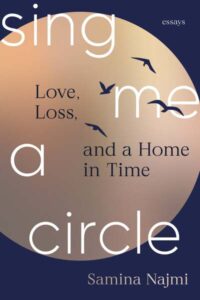There is no obvious throughline that runs through this new collection of Osamu Dazai stories; only a series of Dostoevskian protagonists—young men who smoke too many cigarettes, cower in social situations, and who are consumed by deep insecurity. Written in the second half of the 1930s, Retrograde has been arranged and translated by Leo Elizabeth Takada, who has previously subtitled the Oscar-winning Japanese film Perfect Days for English audiences.

“All points on a circle are always the same distance from the center.” These exquisite personal essays trace the orbit of Pakistani-American author Samina Najmi as she reflects on events, people, and places that shape her traditional childhood in Pakistan and continue to inspire her as she pursues her dreams of education and travel, enlarging her vision and experience of the world.
Harini Nagendra brings the vibrancy of 1920s India to life in the “Bangalore Detectives Club” series, tightly-plotted mysteries interweaving themes of colonialism, women’s empowerment and the environment. In the latest, Into the Leopard’s Den, her fearless sleuth Kaveri Murthy—now pregnant with her first child—travels to the verdant forests and sprawling coffee plantations of Coorg to investigate a murder.
Set against a variety of conflicts from the past century, author and academic Sunny Singh pays tribute to the courage and strength of victim-survivors of war, whose voices mostly go unheard because the victors control the narrative.
What happens if you took one of the classic characters of Chinese literary fiction and dropped him into early 20th-century China? That’s the premise of Wu Jianren’s novel, New Story of the Stone, written in 1905, which takes Jia Baoyu, from the classic Dream of the Red Chamber, and takes him first to Qing China and the Boxer Rebellion, and then to the fantastical “Realm of Civilization”, a world that, in Wu’s eyes, reflected what he thought would happen if people embraced Chinese beliefs.
Naguib Mahfouz (1911-2006) was an Egyptian novelist, short-story writer and screenwriter. He spent his entire life in Cairo, the setting for almost all his fiction. He is best known for The Cairo Trilogy— Palace Walk (1956), Palace of Desire (1957) and Sugar Street (1957)—which follows succeeding generations of a Cairene family, the Abd al-Jawads, from World War I until the Egyptian revolution of 1952. In 1988, Mahfouz became the first, and so far, the only, Arab writer to be awarded the Nobel Prize in Literature.
Some myths take longer to die than others. For students of equine history, the passion that these animals inspire in their owners and breeders often act as a veil, impenetrable for scientists and historians trying to get to the facts. In Horses, Ludovic Orlando, who has been gathering the facts jaw bone by jaw bone for two decades, deploying the latest technology, appears to have pierced the veil, finally, though with many a surprising turn to keep the readers on edge, as though enjoying a detective novel.
This new collection with an unbeatably eye-catching title opens with the eponymous novella. “Courtesans Don’t Read Newspapers” takes more than a few (albeit short) chapters to get to the heart of the story: the red-light district in Kashi (also referred to as Varanasi or Banaras in the novella) is slated to be shut down to make way for new construction. This wasn’t the first time the city had tried to drive out women and girls.
Although no longer as true as it was, East Asian trade in the early-modern period is often presented from the perspective of one more Western nation or another: the Spain’s Manila Galleon trade, the Portuguese spice trade and unique base in Macau, the Dutch East India Company, and latterly, the British via Canton and Hong Kong.
While war is a perennial subject for historians, stories of friendships and exchanges, especially when set aside in the dustier corners of contemporary memory, make equally memorable material for history. A case study is the story of India and Egypt, the subject of East of Empire: Egypt, India, and the World between the Wars in which Erin MB O’Halloran recounts the relationship between the leaders and movements of the two countries between 1919 and 1939, a particularly interesting period that witnessed events such as the abolition of the Caliphate, the Abyssinian crisis, and the partition of Palestine.

You must be logged in to post a comment.